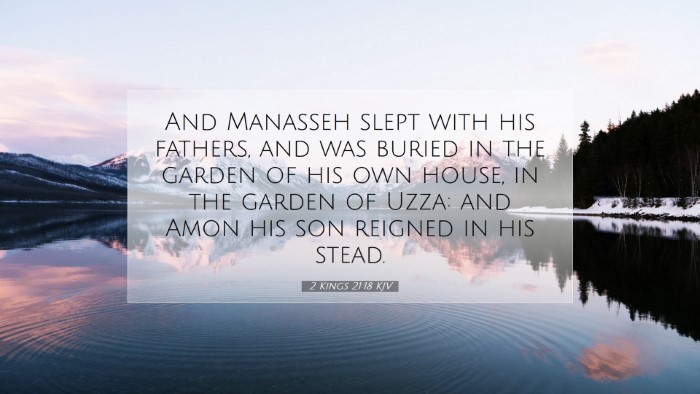Commentary on 2 Kings 21:18
Verse Context: 2 Kings 21:18 states, "And Manasseh slept with his fathers, and was buried in the garden of his own house, in the garden of Uzza: and Amon his son reigned in his stead." This verse marks the conclusion of King Manasseh's reign and introduces the reign of his son Amon.
Overview of Manasseh's Reign
Historical Background:
Manasseh was the son of King Hezekiah and is noted for being one of the most infamous kings of Judah. His reign, lasting fifty-five years, was marked by significant idolatry and the forsaking of Yahweh. This verse captures not just his death but the spiritual ramifications of his long leadership and its influence on Judah.
Interpretation from Public Domain Commentaries
Matthew Henry's Commentary
1. The Legacy of Manasseh: Henry emphasizes that despite the opportunity for repentance, Manasseh led the people of Judah into great sin, which included idol worship and practices abominable to God. His death did not absolve the nation from the consequences of such unfaithfulness.
2. Burial Location Significance: The reference to being buried in the garden of his own house highlights the personal nature of his sin and corruption. Henry points out that such a burial could symbolize his misguided priorities in life, as he chose comfort and pleasure over spiritual integrity.
Albert Barnes' Notes on the Bible
1. Consequences of Idolatry: Barnes notes that Manasseh's reign was one of the darkest periods in Jewish history. He comments on how the introduction of various pagan practices led the nation further astray from God. The phrase 'slept with his fathers' implies a common burial but stands in stark contrast to the nature of his reign.
2. Transition to Amon: Barnes explains that Amon, Manasseh’s son, continued in the same sinful practices of his father, showcasing the generational impact of sin. The narrative serves as a harsh reminder of the importance of righteous leadership.
Adam Clarke's Commentary
1. The Importance of Kingly Example: Clarke provides insights into the importance of a king's example on the society. He highlights that the culture of the kingdom often reflects the leader’s values and choices. Hence, Manasseh's idolatry not only led to national corruption but also to personal depravity.
2. His End and Amon's Rise: Clarke remarks on the swift succession of Amon, which suggests a continuity in the nation's spiritual demise. He draws attention to the implications of a kingdom being unyielding against God's commands, and how it sets a durable precedent that usually breeds destruction.
Theological Reflections
1. The Danger of Uncommitted Leadership: As seen through Manasseh's reign, leaders who fail to commit fully to God create a ripple effect that can influence an entire nation toward sin. This teaches contemporary leaders about the weight of their responsibilities.
2. The Importance of Legacy: Manasseh's life serves as a warning about the legacies we leave behind. Amon's immediate continuation of sinful practices illustrates that a failure of faith in one generation can echo into the next.
3. God's Judgment and Mercy: While Manasseh himself was given a chance for repentance (as chronicled earlier in his story), his persistent sin led to judgment. This duality of mercy and judgment is crucial for understanding God's character throughout Scripture.
Practical Applications
- Leadership Accountability: Leaders are called to be accountable not just for themselves but for their communities. Their choices can lead to spiritual or moral decay.
- The need for Authentic Repentance: True repentance involves a turning away from sin, not merely a regret for consequences. This is essential for a biblical understanding of forgiveness.
- The Power of Influence: The destructive nature of bad leadership highlights the need for righteous individuals to step forward, impacting their spheres positively for Christ.
Conclusion
The examination of 2 Kings 21:18 provides an essential insight into the dynamics of leadership, legacy, and spiritual integrity within the biblical narrative. As students of the Word, it is vital to contemplate these themes within the context of both ancient Judah and the modern church, drawing lessons that will fortify and guide us in our faith journey.


